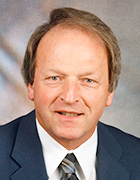
Prof. Dr. Gerd Hirzinger
Career
Having completed his studies in electrical engineering at TUM, Professor Hirzinger joined DLR, the German Aerospace Center, as a member of the research staff (1969). During this time he earned his doctoral degree for his work on control systems engineering and in 1976 was appointed head of automation at the Institute of Robotics and Mechatronics. In 1992 he became the institute’s co-director. From 2001 till 2012 he was the director of the Institute of Robotics and Mechatronics. In 1993 he sent the first remotely controlled robot into space. Under his leadership the institute has become an internationally renowned technology center. A recent joint decision of the German federal and Bavarian state government has turned the institute into a leading competency center.
Professor Hirzinger is the first scientist worldwide to have received all of the top international awards in the field of robotics and automation. He has also been presented with some of Germany’s most prestigious awards including the Leibniz Prize, the Karl Heinz Beckurts Award and the Order of Merit on Ribbon of the Federal Republic of Germany. He has declined offers of appointments to department chairs at major universities in Germany and abroad.
Functions
- Set up and managed the Robotics and Mechatronics Center (RMC) (2009-2012)
- Spokesperson of the Bavarian Competence Network for Mechatronics (BKM) (2001-2005)
- Co-director of DLR's Institute for Robotics and System Dynamics (1992-2009)
- Principal investigator of ROTEX - the first robot in space that successfully flew with the space lab D-2-mission (1987-1993)
- Head of the Automation and Robotics Division at DFVLR (1976-1992)
Awards
- AIAA Space Automation and Robotics Award of the American Institute of Aeronautics and Astronautics (2009)
- IEEE Field Award “Robotics and Automation” (2007)
- IEEE Pioneer Award of the Robotics and Automation Society (2005)
- Order of Merit on Ribbon of the Federal Republic of Germany (2004)
- Gottfried Wilhelm Leibniz Prize (1995)
If you wish your profile to be changed or updated please contact Franz Langer.